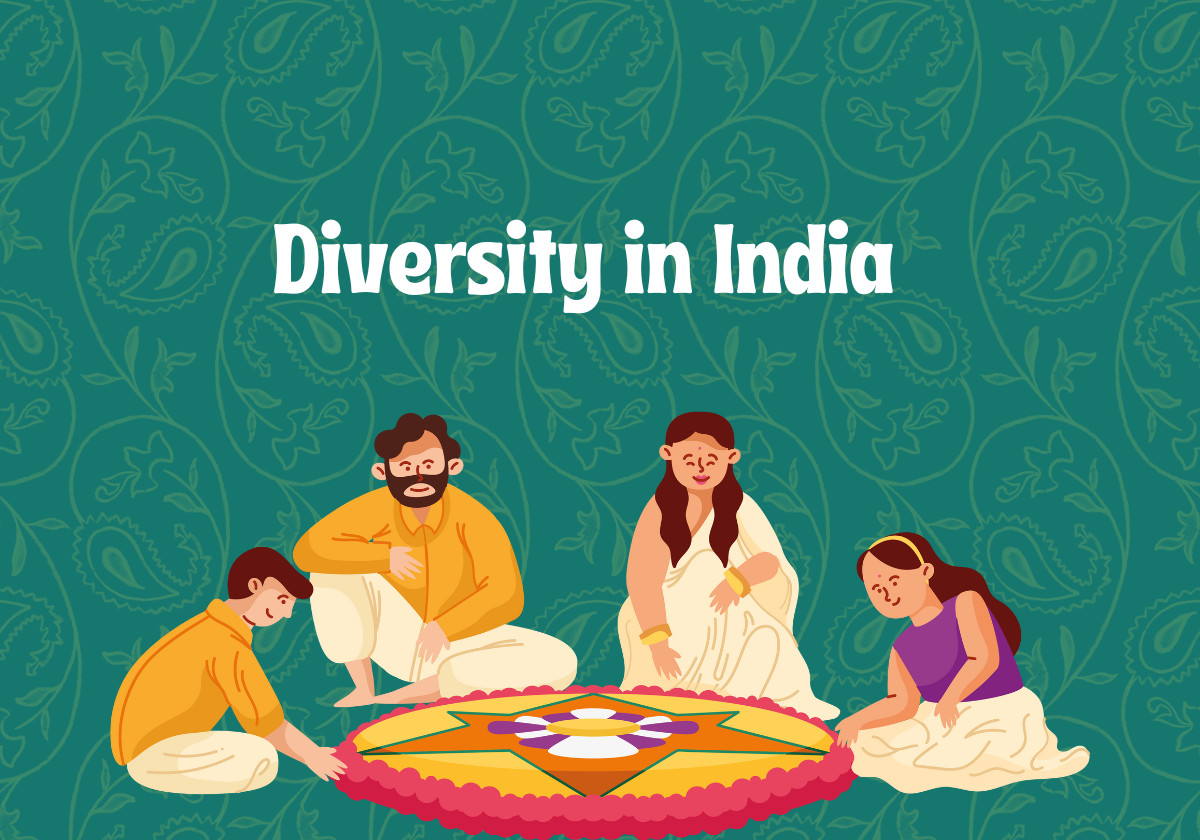India is home to various cultures, religions, languages, and traditions. It is a living example of the saying “Unity in Diversity”. The saying explains the unity in a society or a country inhabited by people of different races and religions. This diversity that India boasts of is not merely an aspect of the Indian population but an indelible part of Indian ethos. From the snow-clad Himalayas in the north to the sun-drenched Ocean and coral reefs in the south, extending west from the arid Thar Desert towards lush green Kerala in the east, the geography and ethnicity of India is remarkable. There has always been this exceptional unity and social peace despite the vast diversity – a belief in development, a multitude of cultures and respect for the nation.
Comprehending the Pluralism in India
Multi-culturalism in India is not limited to only cultures but also includes the intricacies of languages, religions, and ethnicities, as well as regionalism. With an estimated 1.4 billion people India has more than 2000 ethnic groups. As a result, there are more than 1600 languages spoken, all with 22 being legally accepted alongside their numerous dialects. In terms of religion, India comprises almost all the religions in the world including global religions like Hinduism, Islam, and Christianity, as well as Sikhism, Buddhism, and Jainism, so each of these communities is free to practice their religion. It is this mosaic that permeates almost everything in India’s life, including festivities, customs, food, clothing, and rituals. But this multi-faceted dimension is also a factor of India’s strengths and not just its weaknesses.
Unity in Diversity: The Indian Perspective
“Unity in Diversity” is one of the most fundamental tenets of the Indian nation. It is a unity that has allowed India to maintain a democratic structure and progress as one of the largest economies on this planet despite the social and cultural diversity that is typical of its populace. Unity is necessary to be able to enjoy differences without being split by those differences. The oneness of the Indian people is not based on sameness but rather on the understanding that it is the strength that diversity provides that is paramount. This sense of unity serves as an ever-present reminder that no matter how different we are there is a greater cause that binds us together: the cause of the nation, and its success.
Cultural diversity: a matter of pride
One of the greatest gifts to India is its diversity in the form of customs, traditions, languages and other artworks. Dances like Bharatanatyam and Kathak, folk and Bhangra and Garba are some of the components of India’s diverse culture. In terms of the variety of languages spoken, India has a variety that is second to almost none, as languages such as Hindi, Bengali, Telugu, Marathi, Tamil, Urdu, and Punjabi among others are used in the country. Each language is a preserver of a specific cultural practice and is valued among its speakers.
Another example of how India is well endowed with a vast diversity of cultures is its cuisine. Indeed food changes, from one place to another because of the climate, geographical factors, and culture. The northern parts are famous for their rich spicy in flavour curry dishes while the south has its fans with rice and coconut-based dishes. Even though these differences exist, food is one basic thing that many times unites people across religions and cultures.
The Importance of Social Harmony
As a country with many differences, India has unity at its core in the form of social harmony and peace. This is achieved because of the understanding and respect that they have developed over the years as various nations groups, races, and languages exist across the country. Additionally, the Indian Constitution encourages the citizens to be tolerant and be of equal standing without feelings of supremacy over each other. And while communalism, casteism, and regional irrationalism remain key issues for most societies, social cohesion seems to be favourable. In India, many activists and leaders, such as Mahatma Gandhi, have systematically encouraged peace and unity, and so the use of violence has never been a plausible option.
So, if the country’s different races and communities comprise a single identity, it makes the stronghold of the nation’s democratic policies even stronger. The diverse communities can easily be able to come under the roof of a single national identity, uniting them together as one, and this can be promising as well as beneficial. But while the central government tries to protect its national integrity, it also respects the local governance. Moreover, the National Integration Council and some such schemes aim towards the integration of various communities.
Instances of togetherness amidst Diversities
India believes in its motto of unity in diversity as can be inferred from different examples from the history. The idea behind the “Vasudhaiva Kutumbakam” (the world is one family) as some of the oldest texts tell cannot be emphasized enough when emphasizing global harmony which has always been an Indian Perspective. Various leaders such as Jawaharlal Nehru, Sardar Vallabhbhai Patel, Dr. B.R. Ambedkar, and Subhas Chandra Bose came together during the freedom struggle against a common colonial power which aided in the unification of the nation despite belonging to different communities.
Similarly, the Indian Constitution, which belongs to the people whatever their religion, caste, ethnicity or gender provides the fundamental rights and freedoms to the citizens and captures the essence of unity in diversity. The US Constitution is also characterized by the integration of various linguistic diasporic and ethnic and faith-based communities into the wider Indian society.
Also, Indian secularism though not perfect does ensure an atmosphere in which faiths and beliefs co-exist without any harm which serves national integration. Various religions come together to celebrate the same religious occasions which brings a sense of connection and togetherness across communities, for example, the Diwali celebration is the most perfect example where every Indian regardless of their belief system celebrates it with fervour.
Diversity and Its Importance in Society
Every society values and appreciates diversity, and Indian society is no different. After all, people with different backgrounds can together learn, and create and help society grow. It, therefore, stands to reason that people can engage others from different cultures and backgrounds and can stretch how they think.
Additionally, it fosters the sharing of thoughts, languages, and customs, which are good for the nation in several facets. This is what has placed India as one of the countries with the most exciting civilization in the world. In the arts, sciences, business, and education, one thing is certain: India’s various population makes a difference worldwide.
Diversity as A Source of Strength
For quite some time now, the Indian nation has and continues to pride itself on being multi-ethnic. What sets the nation apart is its capability to assimilate its diversity and nationalistic feeling together. Diversity allows people to come together as one society, and work towards the common good, even though traditions may differ. Embracing diversity in education, employment, and politics has enabled India to tap into the skills of many.
India’s foreign policy reflects the contributions of its diversity. For that reason, India seeks to actively participate in organizations such as the World Trade Organization and the United Nations, to name but a few. This willingness to include diversity makes India a more privileged area for international investors, tourists, and academics to visit.
Harnessing the Strength of Diversity
For the days to come, there is a need for the Indian people to pay more attention to appreciating the differences between them while endeavouring to achieve greater social cohesion. Appreciating the differences between cultures and religions is not enough; there is a need to appreciate the importance of fostering communities where all people are cared for, educated and valued. This should involve the promotion of respect, patience and learning among many different cultures, languages, and religions
National and regional leadership in India must help to make it happen. It is through such eventualities that the core values of unity in diversity will be realized. Policies of the government, projects and programs of the community and education policy should aim at the reduction of disparities, bridging of gaps and the fostering of nationalism.
To sum up, in India ‘Unity in diversity’ is not only a slogan, there is a way of living. The multi-ethnic structure of the Indian society does not create conflict but represents the great culture, languages and social issues of the father India. The survival of the Indian state as a secular, democracy with multiple religious and cultural identities owes a lot to the ethos of unity in diversity. It is this unity, which is founded on respect and understanding, that enables India to be dynamic and forward-progressing. More, by appreciating the different facets, we respect the wisdom of the forebears and also, look to the future in the hope for a better tomorrow.

